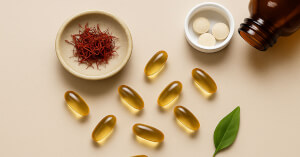
Saffron
Saffron is a spice known for its mood-enhancing properties and potential to support eye and cognitive health.
Saffron (Crocus sativus) is a prized spice derived from the dried stigmas of the saffron crocus flower. It has been used traditionally in Persian and Mediterranean medicine for mood and eye health.
Saffron contains bioactive compounds like crocin and safranal, which may support mood regulation, vision, and antioxidant protection. Supplements use standardized extracts to ensure potency.
Commonly taken for mood support and eye health, saffron has shown promising results in some clinical studies, particularly for mild depression. Further trials are underway to explore its full therapeutic potential.
Other names & forms of Saffron supplement : crocus sativus, saffron stigmas, saffron extract
Possible Benefits
The benefits of saffron include mood enhancement, antioxidant protection, and support for eye and hormonal health:
- May help support Nervous System & Stress Relief by modulating serotonin levels.
- Has been studied for its potential to aid in Weight Loss by reducing appetite and improving insulin sensitivity.
- Provides antioxidant protection, contributing to Anti-Aging and cellular defense.
- May support Eye Health by protecting retinal cells from oxidative stress.
Side Effects
Saffron’s bright hue and mood-enhancing compounds may bring joy, but some users notice mild effects as they begin taking it. Keep an eye out for:
- Occasional mild headache or dizziness, especially when taken on an empty stomach
- Mild gastrointestinal upset, nausea or stomach cramps, if exceeding recommended doses
- Possible dizziness or lightheadedness due to saffron’s effect on blood pressure
- Rare allergic reactions, rash or itching, in those sensitive to crocus species
- Temporary drowsiness or sedation when used for mood support or sleep
Interactions
No significant interactions are reported for Saffron; nevertheless, if you're on antidepressants or blood pressure medications, consult your provider.
Precautions
Before adding Saffron to your routine, confirm you aren’t in any of these cautionary categories. If you are, consult your healthcare provider:
- Pregnant women: High doses can stimulate uterine contractions; avoid unless under medical supervision
- Breastfeeding women: Limited safety data at higher supplemental doses; use under professional guidance
- Individuals with low blood pressure: May cause a further drop; monitor levels and adjust dosage if needed
- People with bipolar disorder: Saffron’s mood effects may destabilize mood swings; use only under psychiatric guidance
- Patients scheduled for surgery: Discontinue at least two weeks prior, potential interactions with anesthesia and bleeding risk
Studies
These studies provide scientific insights into Saffron benefits:
A 2013 randomized, double-blind trial in 60 adults with mild-to-moderate depression showed 30 mg/day saffron extract for 6 weeks improved HDRS scores by 12.7 points versus 8.5 points with placebo, comparable to fluoxetine.
A 2015 randomized trial in 40 men with erectile dysfunction found 200 mg/day saffron for 10 days improved IIEF-15 scores by 17% versus 5% with placebo .
A 2018 crossover study in 20 healthy volunteers reported that 60 mg saffron daily for 4 weeks did not significantly alter appetite, caloric intake, or body weight compared to placebo .
A 2014 randomized trial in 30 metabolic syndrome patients showed 100 mg/day saffron for 8 weeks did not change fasting glucose or lipid profiles versus placebo .
Disclaimer: This page is for educational purposes and does not replace medical advice. If you're pregnant, have a condition, or take medication, speak with a qualified professional.








